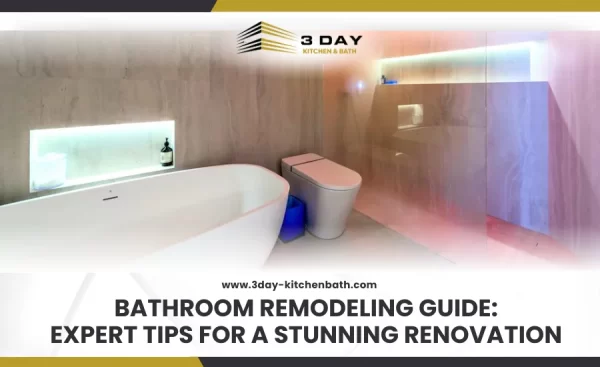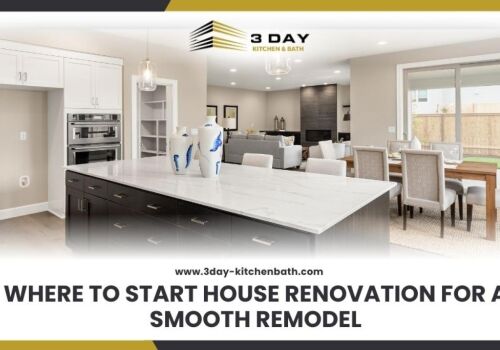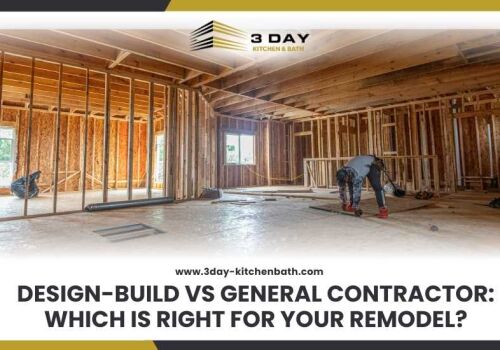Redesigning your bathroom is an opportunity to create a space that reflects your personal style while meeting your home's functional needs. Whether you're starting from scratch or updating specific features, a well-thought-out plan can make the process smoother and more enjoyable. This bathroom remodeling guide will walk you through every step, providing practical tips, insights, and inspiration to ensure your project is a success.
- Why Plan Before You Remodel?
- Setting a Realistic Budget
- Pros and Cons of Durable Materials vs. Cheaper Alternatives
- The Design Phase: Turning Ideas into Plans
- Choosing the Right Layout
- Selecting Fixtures and Features
- Materials and Finishes: Balancing Style and Durability
- Flooring Options
- Wall Finishes
- Countertops
- Eco-Friendly Remodeling Ideas
- Water-Efficient Fixtures
- Energy-Efficient Lighting
- Sustainable Materials
- The Remodeling Process: What to Expect
- Step 1: Demolition (2â3 Days)
- Step 2: Plumbing and Electrical Work (3â7 Days)
- Step 3: Flooring and Wall Finishes (5â7 Days)
- Step 4: Installing Fixtures and Accessories (3â5 Days)
- Step 5: Final Inspections and Cleanup (1â2 Days)
- Common Pitfalls to Avoid
- How Long Will the Project Take?
- Maintaining Your New Bathroom
- Why Choose 3 Day Kitchen & Bath in San Diego, CA?
- Frequently Asked Questions
- How do I know if my bathroom needs a remodel?
- What is the most challenging part of remodeling a bathroom?
- Can I remodel my bathroom on a tight budget?
- How do I choose the right materials for my bathroom?
- What sets 3 Day Kitchen & Bath apart from other remodelers?
- Transform Your Space with 3 Day Kitchen & Bath
Why Plan Before You Remodel?
Planning is the foundation of any successful remodeling project. A clear vision prevents losing focus, exceeding your budget, or facing unexpected issues. A recent study by Frontdoor highlights the significance of bathroom remodels, showing that improvements like upgrading shower and tub panels can add approximately 0.92% to a home's value. That's a meaningful return on investment (ROI), especially if you plan to sell your home.
To get started, identify the purpose of your remodel. Are you looking to modernize outdated features, improve functionality, or enhance aesthetics? Once your goals are clear, the rest will fall into place more easily.
Setting a Realistic Budget
Budgeting may not be the most exciting part of a remodel, but it's one of the most critical. A well-defined budget helps you prioritize features and make informed decisions. Allocate funds for essentials like plumbing, fixtures, and finishes while leaving room for unexpected expenses. According to Houzz, many homeowners encounter hidden costs during bathroom renovations, underscoring the importance of thorough planning. These surprises often stem from unforeseen structural issues, outdated plumbing, or changes to the original design plan.
Pros and Cons of Durable Materials vs. Cheaper Alternatives
| Category | Durable Materials | Cheaper Alternatives |
|---|---|---|
| Initial Cost | Higher upfront cost due to quality materials and craftsmanship. | Lower initial cost, making it easier to stay within a tight budget. |
| Longevity | Longer lifespan, requiring fewer repairs or replacements over time. | Shorter lifespan, often leading to frequent repairs or replacements. |
| Aesthetic Appeal | Premium look and feel that enhances the overall design of your bathroom. | Basic appearance that may not align with modern or high-end designs. |
| Maintenance | Easier to maintain due to better finishes and durability. | May require frequent cleaning, sealing, or refinishing to maintain. |
| Return on Investment (ROI) | Higher ROI as durable materials are more appealing to future buyers. | Lower ROI as buyers may perceive the bathroom as requiring upgrades. |
Pro Tip: Keep a contingency fund of 10–15% of your budget for unexpected issues, such as plumbing repairs or material delays.
The Design Phase: Turning Ideas into Plans
Once you've defined your goals and budget, it's time to bring your vision to life. The design phase is where functionality and creativity intersect.
Choosing the Right Layout
Your bathroom layout should maximize space and functionality. Common layouts include:
| Layout | Image | Pros | Cons |
|---|---|---|---|
| Single-Wall | 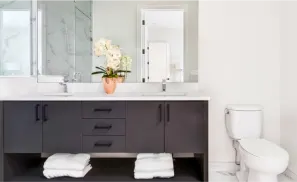 |
- Space-saving design
- Simple and cost-effective |
- Limited storage
- Less countertop space |
| L-Shaped | 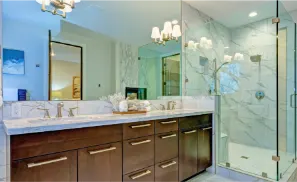 |
- Separates wet and dry areas
- Works well for medium-sized bathrooms |
- Requires more space than single-wall
- Plumbing adjustments may increase costs |
| Open-Concept | 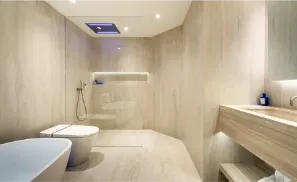 |
- Spacious and modern aesthetic
- Ideal for large bathrooms |
- Privacy concerns
- Careful planning needed to avoid water splashes |
Selecting Fixtures and Features
When choosing fixtures, think about both form and function:
- Bathtubs: Freestanding tubs create a statement, while built-in options are practical for families.
- Showers: Walk-in showers with frameless glass doors offer a sleek, modern look.
- Vanities: Double vanities are ideal for shared bathrooms, while floating vanities can create the illusion of more space.
Materials and Finishes: Balancing Style and Durability
The materials you choose play a significant role in the longevity and appearance of your bathroom.
Flooring Options
Popular choices include ceramic tiles, natural stone, and luxury vinyl planks. Consider water-resistant and slip-resistant materials for safety and maintenance ease.
Wall Finishes
From subway tiles to textured wallpaper, your walls offer a chance to showcase creativity. Choose finishes that are easy to clean and resistant to moisture.
Countertops
Quartz, granite, and solid surfaces are durable and visually appealing options. Think about your overall color scheme and how the countertop complements other elements.
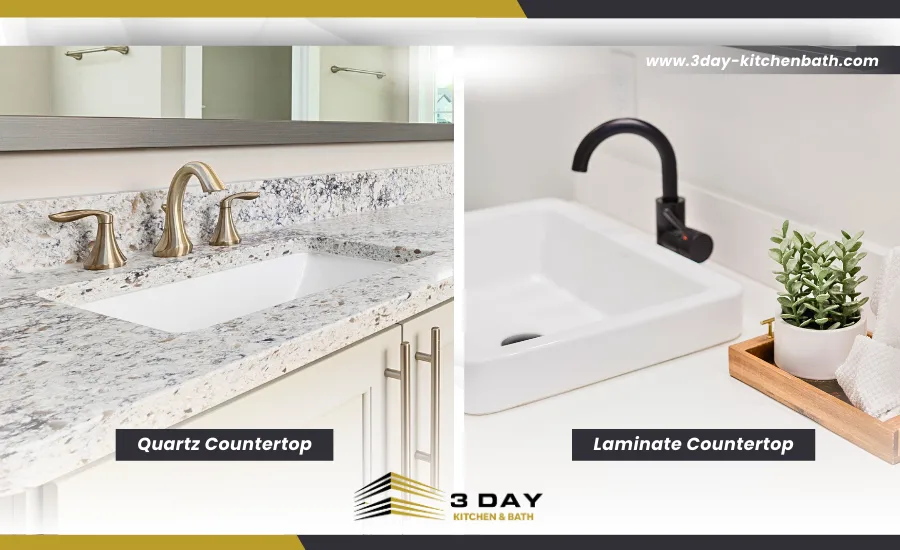
Eco-Friendly Remodeling Ideas
Sustainability is more than a trend; it's a responsible choice for the environment and your wallet.
Water-Efficient Fixtures
Install low-flow toilets, faucets, and showerheads to conserve water without sacrificing performance.
Energy-Efficient Lighting
LED lights reduce energy consumption and offer a wide range of design options.
Sustainable Materials
Opt for recycled glass tiles, bamboo flooring, or reclaimed wood for a touch of eco-conscious luxury.
The Remodeling Process: What to Expect
Remodeling can be a complex process, but breaking it into manageable steps will keep you on track.
Step 1: Demolition (2–3 Days)
This phase involves tearing down old fixtures, cabinets, flooring, and walls where necessary. It's often the messiest part of the project, so proper preparation is essential.
Tips for Staying on Schedule:
- Rent a dumpster in advance for debris removal.
- Use protective coverings to prevent dust from spreading to other parts of your home.
- Coordinate with your contractor to confirm which items will be removed and salvaged.
Step 2: Plumbing and Electrical Work (3–7 Days)
Plumbing and electrical upgrades form the foundation of your remodel. Whether you're moving a shower or upgrading to a double vanity, this step requires professional expertise to ensure everything complies with local building codes.
Tips for Staying on Schedule:
- Ensure all permits are approved before starting this phase.
- Pre-order plumbing and electrical components to avoid delays.
- Keep communication open with your plumber and electrician to address any unexpected issues quickly.
Step 3: Flooring and Wall Finishes (5–7 Days)
Flooring and wall finishes, such as tiles or paint, are installed during this phase. These elements add the aesthetic foundation for your new bathroom.
Tips for Staying on Schedule:
- Allow for tile curing time, which can take 24–48 hours depending on the type of adhesive used.
- Choose easy-to-install flooring options, like luxury vinyl planks, if time is a concern.
- Confirm color and pattern choices early to avoid delays caused by last-minute changes.
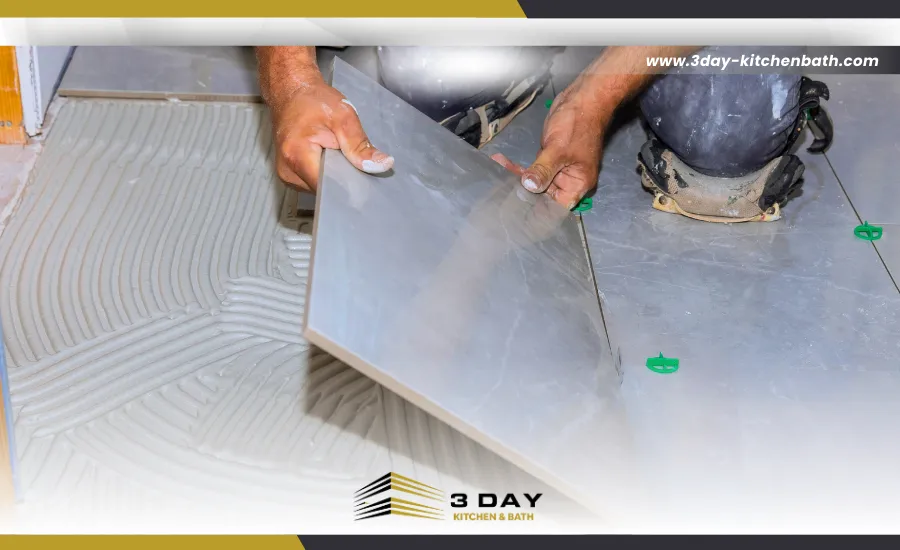
Step 4: Installing Fixtures and Accessories (3–5 Days)
This step includes adding faucets, mirrors, lighting, towel bars, and other smaller elements that bring the design together.
Tips for Staying on Schedule:
- Keep all smaller fixtures organized and labeled for quick installation.
- Review your lighting plan to ensure fixtures are installed at the correct height and placement.
- Perform a final walkthrough with your contractor to confirm no accessories are overlooked.
Step 5: Final Inspections and Cleanup (1–2 Days)
Before you can fully enjoy your remodeled bathroom, final inspections ensure everything is safe and up to code. This phase also involves cleaning up the workspace and touching up any minor issues.
Tips for Staying on Schedule:
- Schedule inspections in advance to avoid waiting times.
- Make a punch list of small fixes or adjustments needed before final approval.
- Plan for a deep clean to remove construction dust and debris.
Common Pitfalls to Avoid
Even with careful planning, making mistakes during a remodel is easy. Here are a few common pitfalls and how to sidestep them:
| Pitfall | Potential Cost/Impact | Preventive Measures |
|---|---|---|
| Overloading the Space | Crowded bathrooms reduce functionality and aesthetics. | Plan your layout carefully; prioritize essential fixtures and avoid unnecessary additions. |
| Skipping Storage | Leads to clutter and disorganization. | Incorporate built-in storage solutions, such as shelves, cabinets, or vanities with drawers. |
| Ignoring Ventilation | Mold, mildew, and moisture damage. | Install or upgrade an exhaust fan and ensure proper airflow through windows or vents. |
| Underestimating Costs | Budget overruns due to unforeseen issues. | Set aside 10–15% of your budget for contingencies, such as plumbing or structural surprises. |
| Choosing Style Over Function | Impractical designs (e.g., lack of counter space). | Balance aesthetics with functionality; ensure fixtures and vanities meet your day-to-day needs. |
| DIY Plumbing and Electrical Work | Risk of costly mistakes and safety concerns. | Hire licensed professionals to handle plumbing and electrical tasks to meet building codes and ensure safety. |
| Rushing the Timeline | Missed inspections or poor-quality work. | Work with contractors to set realistic timelines and stick to them. |
How Long Will the Project Take?
The timeline for a bathroom remodel varies depending on the scope of work. Smaller updates can take a few days, while full-scale renovations may span several weeks. Be realistic about your schedule and communicate regularly with your contractor.
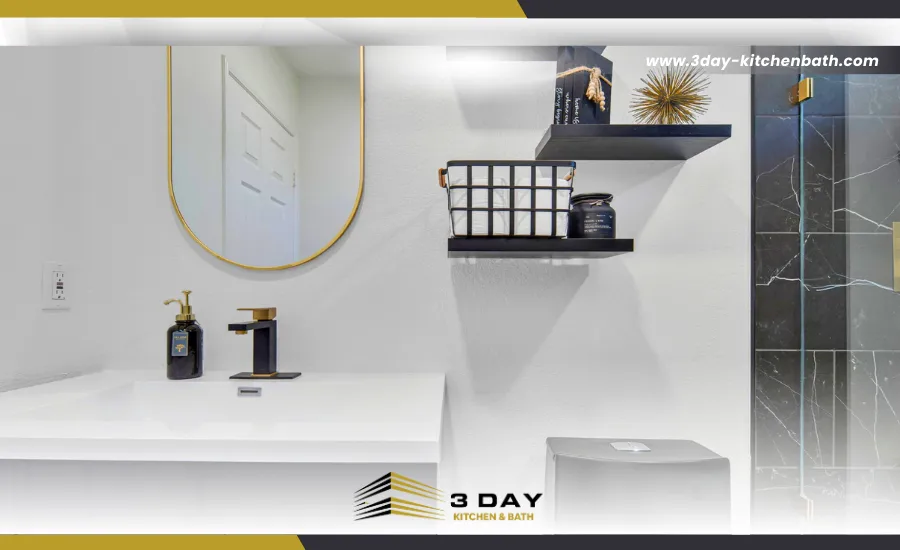
Maintaining Your New Bathroom
Once the remodel is complete, regular maintenance will keep your bathroom looking its best. Here are some tips:
- Clean tiles and grout regularly to prevent buildup.
- Wipe down fixtures to maintain their shine.
- Check plumbing connections periodically to catch leaks early.
Why Choose 3 Day Kitchen & Bath in San Diego, CA?
When you're ready to begin your bathroom remodeling journey, 3 Day Kitchen & Bath in San Diego, CA, is your trusted partner. Our commitment to delivering exceptional results quickly and efficiently makes us the ideal choice for homeowners seeking professional solutions. With decades of expertise, innovative approaches, and a customer-focused mindset, we bring your vision to life with ease.
Whether you need a comprehensive bathroom remodeling guide brought to life or targeted updates to modernize your space, we ensure that every detail reflects your unique style and needs.
Frequently Asked Questions
How do I know if my bathroom needs a remodel?
Signs include outdated fixtures, poor functionality, and visible wear and tear. A remodel can also be an excellent opportunity to improve energy efficiency.
What is the most challenging part of remodeling a bathroom?
Plumbing and electrical work often present challenges, making professional assistance essential for these stages.
Can I remodel my bathroom on a tight budget?
Yes! Focus on cost-effective upgrades like replacing fixtures, refinishing cabinets, or updating the paint color.
How do I choose the right materials for my bathroom?
Consider durability, moisture resistance, and design compatibility when selecting materials for flooring, countertops, and finishes.
What sets 3 Day Kitchen & Bath apart from other remodelers?
Our unique approach combines speed, quality, and customer-focused service, ensuring your project is completed efficiently without compromising on craftsmanship.
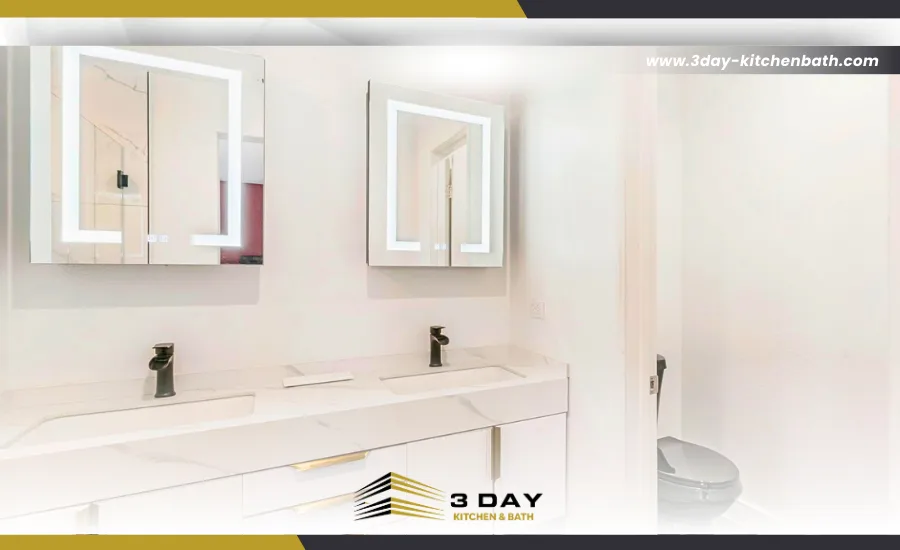
Transform Your Space with 3 Day Kitchen & Bath
Your dream bathroom is closer than you think. Contact 3 Day Kitchen & Bath in San Diego, CA, today to start your remodeling journey. Let our experts guide you through the process, delivering stunning results that elevate your home.

